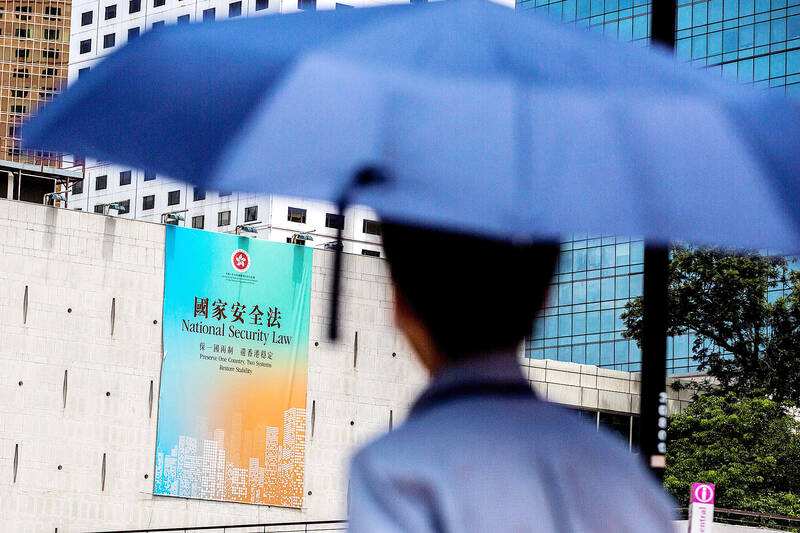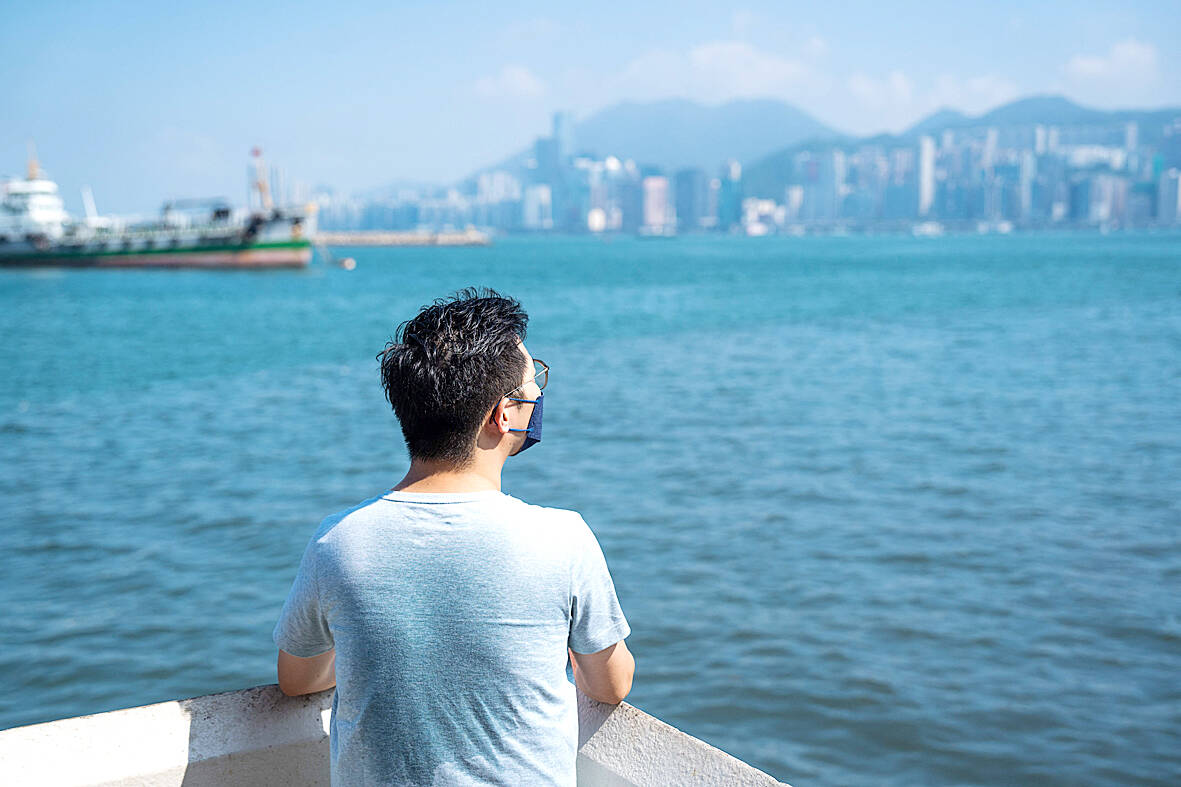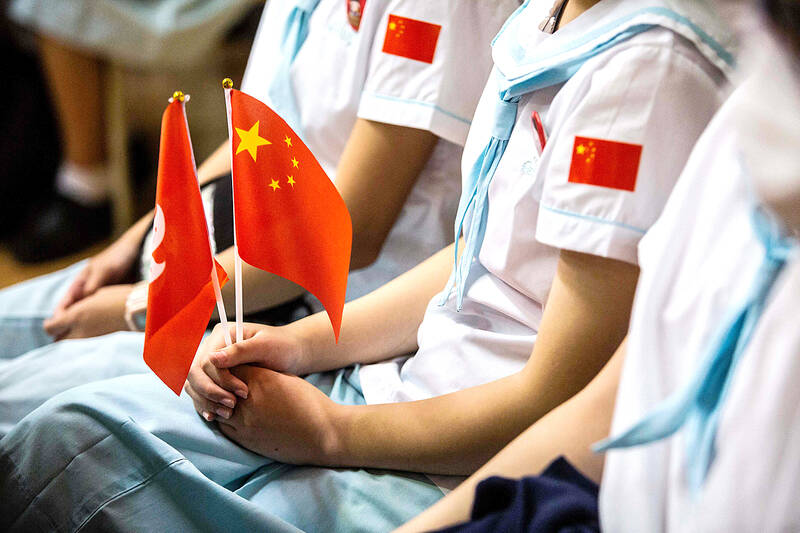As Hong Kong students return for the new academic year, veteran teacher Wong is counting down the days until the political maelstrom sweeping the city leaves him no choice but to quit.
Wong, 34, fears he will soon join the exodus of teachers and students triggered by Beijing’s tightening grip on Hong Kong, which has started transforming local schools, according to multiple educators.
The latest government figures show more than 4,000 teachers left their jobs in the past school year, a five-year high and a 70 percent spike from the year before.

Photo: AFP
“I have no faith in the future of Hong Kong or that of the industry. It is hard to nurture a person in this environment,” Wong, who asked to use just his surname, said.
The political crackdown has coincided with the coronavirus pandemic, during which Hong Kong has kept strict zero-COVID rules that have fueled further departures. Students have pulled out of school in droves, with 30,000 fewer attending primary and secondary school in September last year compared to the preceding October.
Wong, who has taught for more than a decade, said five teenagers from his class of 32 withdrew halfway through a term to emigrate.

Photo: AFP
“The students are leaving not because they dislike the school, but because of Hong Kong’s environment.”
PATRIOTIC CLASSROOMS
China is remolding once outspoken Hong Kong in its own authoritarian image, following massive and sometimes violent democracy protests in 2019 in which youngsters played a key part.

Photo: AFP
Teachers have since been ordered to instil patriotism in students and comply with a Beijing-imposed national security law that has criminalized much dissent.
Curriculum are being tweaked to align more closely with Chinese Communist Party ideology.
Earlier this month teachers were told to “study and learn the key messages” of a recent speech by President Xi Jinping (習近平).
Students and parents have also been encouraged to report teachers who might be breaching the security law. Wong received a letter of reprimand from Hong Kong’s Education Bureau last year after his teaching materials analysing the pros and cons of civil disobedience drew anonymous complaints.
“It shattered the trust that was fundamental to teaching,” he recalled.
Between 2019 and last year, Hong Kong authorities received 344 complaints against teachers in relation to the democracy protests, with 55 percent of cases found to be substantiated.
One high-school principal said he would instruct staff to keep their heads down and comply with government guidelines to the letter.
“Everyone is being very careful ... If some (teaching materials) may touch on political sensitivities, then we’ll skirt around it,” said the principal, who requested anonymity. “Nobody wants trouble and the teachers don’t want to be held personally responsible.”
LOWER STANDARDS?
Authorities have rejected the idea of an emigration wave and argue teachers choose to leave their posts for various reasons, including retirement and further study.
Hong Kong’s education chief said schools were generally operating smoothly and there were enough qualified teachers despite a “slightly higher” attrition rate.
But a recent survey of 140 schools showed each institution on average lost 32 students and seven teachers over the past year.
Newspaper Ming Pao surveyed its classified section and found at least 200 schools were still looking for teachers in late July. In previous years most vacancies would be filled by the end of May.
Administrators say some schools have been forced to hire less-qualified candidates.
Schools are also competing to poach students, as their headcount often determines their government subsidies and protects against closure.
And education is not the only sector affected by brain drain. The city’s labor force has dropped about six percent since 2018 to 3.75 million people, according to the latest official figures, the lowest number in nearly a decade.
A new generation of Hong Kong teachers are now weighing options and assessing risks that come with their careers.
University graduate Mak, 23, has spent a year teaching English at a secondary school even though he does not have a teacher’s diploma — a fact his employer did not seem to mind.
“I’ll continue teaching for the next few years, but not necessarily in the long term,” he said.
Mak feels he has little control over what happens to his profession.
“There’s not much that can be changed,” he sighed. “You either submit, or quit.”

June 9 to June 15 A photo of two men riding trendy high-wheel Penny-Farthing bicycles past a Qing Dynasty gate aptly captures the essence of Taipei in 1897 — a newly colonized city on the cusp of great change. The Japanese began making significant modifications to the cityscape in 1899, tearing down Qing-era structures, widening boulevards and installing Western-style infrastructure and buildings. The photographer, Minosuke Imamura, only spent a year in Taiwan as a cartographer for the governor-general’s office, but he left behind a treasure trove of 130 images showing life at the onset of Japanese rule, spanning July 1897 to

The Taiwan People’s Party (TPP) on May 18 held a rally in Taichung to mark the anniversary of President William Lai’s (賴清德) inauguration on May 20. The title of the rally could be loosely translated to “May 18 recall fraudulent goods” (518退貨ㄌㄨㄚˋ!). Unlike in English, where the terms are the same, “recall” (退貨) in this context refers to product recalls due to damaged, defective or fraudulent merchandise, not the political recalls (罷免) currently dominating the headlines. I attended the rally to determine if the impression was correct that the TPP under party Chairman Huang Kuo-Chang (黃國昌) had little of a

In an interview posted online by United Daily News (UDN) on May 26, current Chinese Nationalist Party (KMT) Chairman Eric Chu (朱立倫) was asked about Taichung Mayor Lu Shiow-yen (盧秀燕) replacing him as party chair. Though not yet officially running, by the customs of Taiwan politics, Lu has been signalling she is both running for party chair and to be the party’s 2028 presidential candidate. She told an international media outlet that she was considering a run. She also gave a speech in Keelung on national priorities and foreign affairs. For details, see the May 23 edition of this column,

At Computex 2025, Nvidia CEO Jensen Huang (黃仁勳) urged the government to subsidize AI. “All schools in Taiwan must integrate AI into their curricula,” he declared. A few months earlier, he said, “If I were a student today, I’d immediately start using tools like ChatGPT, Gemini Pro and Grok to learn, write and accelerate my thinking.” Huang sees the AI-bullet train leaving the station. And as one of its drivers, he’s worried about youth not getting on board — bad for their careers, and bad for his workforce. As a semiconductor supply-chain powerhouse and AI hub wannabe, Taiwan is seeing